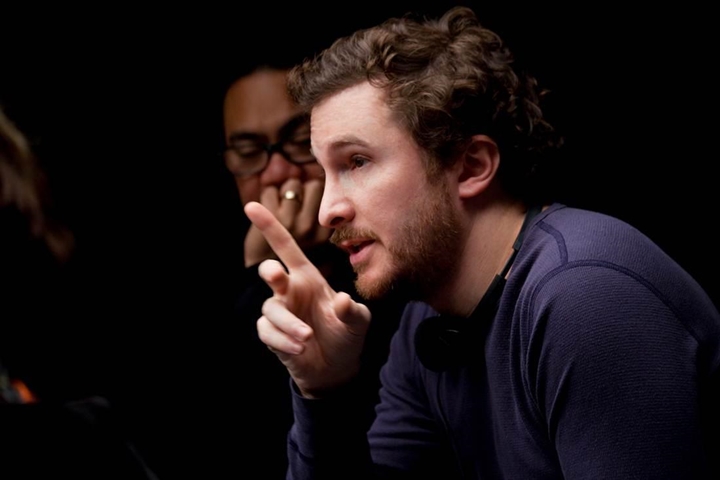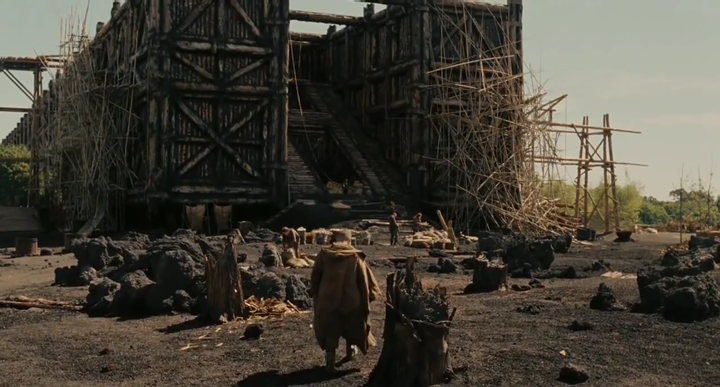
Darren Aronofsky hopes his audience finds the lessons in 'Noah'; Lessons about original sin, and second chances, and the mercy that God chose. Aronofsky says he's trying to bring the story to a relateable level, with his rendition.
Although the new movie that he directs and co-wrote along side his long-time collaborator friend Ari Handel has taken some hits with critics for the dramatic license it takes, Aronofsky claims that in order to make the Noah movie stay true to the essence of the sacred biblical story, he had to take those liberties.
In a recent interview with The Salt Lake Tribune Aronofsky explained where the idea for the film came from, and why it was important to tell the story the way he chose to tell it.
According to the director, it all started in a Junior High English class.
I got connected to the story in such a deep way when I was in seventh grade," he said. "I had this magical English teacher. One day, she said, "Alright, everybody take out a pen and paper, and write something about peace." I wrote a poem called "The Dove" about Noah."
He calls the Noah story, his "patron saint" story because this was the first time he thought of himself as a story teller. He said he kept coming back to the story after that. In fact, many of his films have had biblical themes, even if they were just presented in metaphor. "The Wrestler", which he directed in 2008, is a story of sacrifice, and "The Fountain" from 2006, starring Hugh Jackman, is a story of a man who seeks eternal life through love, and involves a quest for the garden of Eden, and the tree of life.

Aronofsky says the Noah story affected him on a deeper level, and caused a sort of terror that he couldn't quite understand. He said the story forced him to consider original sin and its implications.
"The idea of original sin is a really interesting story to help us all think about what goes on inside of us, that we all kind of have a sense of the right thing to do, and we all understand what the wrong thing to do is. And we understand that there's a decision in front of us," he said.
"We started to realize these big ideas about justice and mercy in the film. It started with Noah being called righteous in his generation, and we tried to figure out what that meant. What we've discovered is that people who are a lot smarter than us and who study theology talk about righteousness as having a balance of justice and mercy. As a parent, you understand that if you're too just, you can destroy your child with strictness, and if you're too merciful you can destroy them with leniency. Finding that balance makes you a great parent."
"For us, since Noah is called righteous, we asked, 'OK, what is his balance of justice and mercy?' So at the beginning of the film, he clearly wants justice, very much like God. By the end, when the rainbow happens, he has learned mercy, forgiveness and grace."
As far as taking liberties to reach that story, Aronofsky says it would be impossible to make an exact retelling of the Noah story.
"Of course there's liberties," he said, "I mean, we're making a movie here. If you read the four chapters that the Noah story takes place in, Noah doesn't even speak. How are you going to cast Russell Crowe and not have him talk? Noah's wife and his sons' three wives aren't even named in the Bible."
If you read the story of Noah, it's very straightforward," he continued. " The character of Noah just builds the ark and collects the animals. But the struggles, the effort of building an ark, of being responsible for all those animals, being responsible for your family, it's not explored at all. So how exciting to actually say, "Oh wow, here's this great story, how do we put human emotion into it?"
Aronofsky tried to find the 'spirit' of the Noah story. He sees Noah relating to God's pain at all the wickedness he saw before the flood.
"If you think about that moment, when God looks at the wickedness, it grieved him to his heart." Aronofsky said. "We wanted to get that grief, that struggle, and stick it into Noah, so we can understand as people what it must have felt like. What would hurt more than to do - in vague terms - what Noah is about to do? Which for us was an exact metaphor for what the decision was, what the Creator went through. But he chose love! He chose mercy, which for us is the exact same story as the story in the Bible, just put into human terms."
In another recent interview with The Atlantic, Aronofsky says he could not have made a documentary even if that was his goal, but he tried not to go against the Bible.
"It's impossible to understand what these times are because there are four chapters in the Bible. It's just important that you don't contradict any of it and that you study each word, and study each sentence, and try to use and extract as much juice out of that to be inspired to turn it into a vision that represents the spirit of it all. That's the goal."
The film stars Russell Crowe and is set to hit theaters nationwide Friday.


















